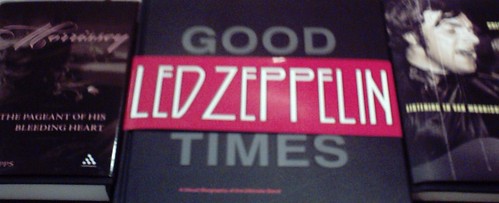
As with any Marcus book, it tells more about the author than the subject and, yet again, we're reminded this is the man who (at Rolling Stone) declared war on Stevie Nicks, the Wilson sisters, Carly Simon and any other woman not content to be a puppet for a male producer. That sexism can be found in the book repeatedly and certainly explains how 183 pages allegedly on Morrison can somehow never manage to even mention Jackie DeShannon.
Not only did the recent Songwriter's Hall of Fame inductee sing backup on his Hard Nose The Highway, they wrote songs together and he produced an album for her that Atlantic still refuses to release. There are several stories in that -- none of which interest Marcus.
Somehow Gavin Hopps managed to write the book Marcus repeatedly attempts to. Hopps' Morrissey: The Pageant Of His Bleeding Heart is an in depth examination of Morrissey. Here he is on the Smiths' "Hand In Glove:"
Morrissey's innuendo largely relies on the use of ambiguous words or phrases. On account of their referential openness, pronouns and other indefinite parts of speech are a particular favourite and fertile resource: 'well it's here/right under your nose'; 'I keep mine hidden'; 'you gave me something I won't forget too soon'; 'And if the lights were out/could you even bear/ to kiss her full on the mouth (or anywhere?). For the same reason, 'things' is another favourite of Morrissey's (as it was of Alexander Pope): 'these things take time'; 'he knows so much about these things'; 'All the streets are crammed with things/ eager to be held'; 'Why do you come here/ when you know it makes things hard for me?' Innuendo is a kind of parasitic discourse, which leaves its eggs in other birds' nests, and so there are, as we might expect, all sorts of other words and phrases which are used in Morrissey's lyrics to carry a supplementary cargo: 'And when we're in your scholarly room / who will swallow whom?'; 'And Sorrow's native song, / He will not rise for anyone'; 'you can pin and mount me like a butterfly'; 'I've not been feeling myself tonight'; 'It was dark as I drove the point home.'
It's a strong examination of Morrissey -- a subject we'd bet is more difficult to get a handle on than Van Morrison. But possibly one 'too soft' for Marcus? If so, more power to Gavin Hopps for tackling the artist. Good Times, Bad Times: A Visual Biography of the Ultimate Band focuses on Led Zeppelin. Jerry Prochnicky and Ralph Hulett have gathered a variety of photographs that provide a new look at the band both due to their context and due to the photographs themselves.
For example, page 94 features an illuminating photo of Robert Plant with his daughter Carmen in his lap. The Mike Randolph photo features a more mature looking Plant (when contrasted with onstage photos of the same era) and a an obviously thrilled Carmen in what may tell the story of the cost of touring better than anything else.
Anthony DeCurtis contribute the introduction to the volume and places the group in the proper context:
The year 1969 saw the release of Who's rock opera Tommy and the Beatles' Abbey Road, but also the Rolling Stones' premonitory Let It Bleed. The last date of the Stones' tumultuous American tour that year occurred at the Altamont Speedway in California, where the Hell's Angels, who were, unbelievably enough, hired to provide security at the concert, rioted instead and murdered a black man in the audience -- a black man who was himself wielding a pistol.
